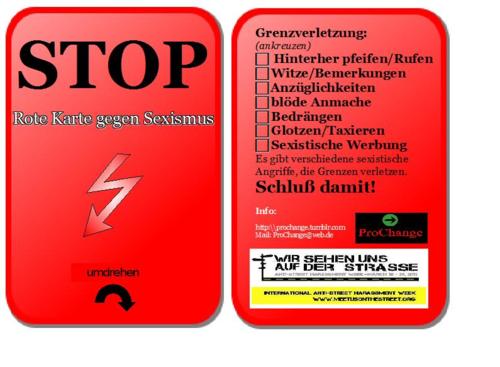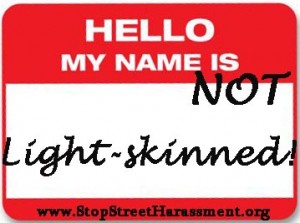USA: “Like a Girl” and “Street Compliments” – Building Blocks to Sexual Violence
Mariel DiDato, NJ, USA, SSH Blog Correspondent
“Hold on” You may have thought to yourself after reading the title of this article, “I’ve told my sisters that they throw like ‘girls.’ It was just a joke. It has nothing to do with sexual violence.”
Directly speaking, no, it doesn’t have to do with sexual violence. However, telling a kid that they “(insert verb here) like a girl” is saying to that kid, boys are better at that thing than girls, and that they should emulate boys if they want to be good enough.
Or quite possibly, you thought, “Woah! I’ll tell a woman she’s sexy if I see her on the street, but I wouldn’t rape her.”
Fair enough. A street harasser may not ever think to rape someone, but somewhere along the line, they were taught that it is normal and acceptable to disregard a woman’s comfort so that they could tell her how sexy she is. Maybe someone else takes it a step further and follows a woman, demanding her attention. The next person might take it one step further and grab a woman inappropriately on a crowded street or bus. The next might become violent upon rejection, because his right to her body is more important than her right to say no. The line between any of these acts is a fine one, especially if they take place on a regular basis.
Ever ask for a woman’s number and then threaten to call it before she leaves to make sure she put in the correct number? Ever think that maybe she doesn’t want you to have her number?
Ever pressure a woman to have sex after multiple “No’s” or “I don’t want to’s,” for her to finally give in? Ever think that maybe she doesn’t want to have sex and that she’s either tired of saying “no,” or afraid of what you’ll do if she doesn’t eventually say “yes”?
Rape culture isn’t a myth that the progressive left came up with to place blame on men who have never committed sexual violence. It’s a term studied and used by professionals in this field to describe the aspects of society that condone and encourage violence against women.
“Woah, hold it!” You might be thinking, “Rape is one of the worst crimes someone can commit! Our society doesn’t condone rape!”
Stay with me, and just hear me out. It’s a more complicated idea than that.
The violence pyramid is the concept that sexual violence wouldn’t be so prevalent if sexual harassment wasn’t condoned. In addition, sexual harassment wouldn’t be condoned if sexist attitudes weren’t taught from childhood. From “You throw like a girl!” to “Nice tits, sweetheart!” to “She shouldn’t have gotten drunk if she didn’t want to be raped,” these themes are connected. Victim-blaming, refusal to believe survivors of sexual assault, and physical manifestations of sexual violence cannot proliferate without first building the primary bases of sexism. If boys are just naturally better and more valuable than girls, boys’ desires must be more valuable than girls’ comfort. If young boys see men harassing women in public, maybe it’s okay to harass girls at school in the hallways. If the people around boys make jokes about sexual assault, and blame victims of rape more than abusers, maybe committing rape isn’t even such a big deal to begin with. And if all of this is something that “only happens to girls,” what happens when a male becomes a survivor of sexual assault?
If sexual assault is the victim’s fault because “Some people are just psychopaths. You can’t prevent it. You can only take measures to protect yourself,” why are rape and molestation far more common than murder? If society truly believed that sexual violence is truly only committed by “psychopaths,” why are we quick to ignore the acts of Nate Parker, R. Kelly, and so many more abusers in favor of their careers? Is it any wonder that convicted rapists such as the infamous Brock Turner, and more recently Austin James Wilkerson, received laughable sentences for committing a serious felony? Society is quick to decry the effects of rape culture, but quick to deny its existence. We need to acknowledge the ugly parts of our society that allow for these occurrences to be so commonplace and unpunished.
Throw out the ideas that men should be sexually dominant and promiscuous, and women should be sexually inexperienced and submissive, that it’s okay for boys and men to shout sexually charged “compliments” to women in public, and that men are entitled to women’s time, attention, and sexuality. Replace these with the concept that rejection is okay, and shouldn’t be met with persistence. Reinforce the fact that people on the receiving end of harassment and assault are never at fault. Stress to young children that doing anything “like a girl” is just as good as doing it “like a boy.” We can only work towards long-term solutions if we acknowledge the root of the problem. It’s hard to teach an old dog new tricks, but it’s easier to teach young children that all people, regardless of demographic, are worthy of respect.
Mariel is a recent college graduate, feminist, and women’s rights activist. Currently, she volunteers for a number of different organizations, including the Planned Parenthood Action Fund of New Jersey and the New Jersey Coalition Against Sexual Assault. You can follow her on Twitter at @marieldidato or check out her personal blog, Fully Concentrated Feminism.
ProChange distributed 2000 cards in Dortmond, Germany
Editor’s Note: This guest blog post is reprinted from the ProChange Facebook page about the action they took for International Anti-Street Harassment Week 2012:
[I used Google translate….see the original German text below)
The 18 March to 24 March 2012 was the International Week Against Street Harassment. Worldwide there were events and actions. ProChange joined in and participated in it.
 We distributed 2000 “Red Card” against sexism, “Pink Card” against homophobia, and “Purple Card” Courage for the day. At night we shared our special coasters in pubs, bar, from clubs in Dortmund, Germany. Summary, detailed report and pictures will be published soon.
We distributed 2000 “Red Card” against sexism, “Pink Card” against homophobia, and “Purple Card” Courage for the day. At night we shared our special coasters in pubs, bar, from clubs in Dortmund, Germany. Summary, detailed report and pictures will be published soon.
Our commitment does not end with the end of the campaign week. Sexist boundary violations and sexual violence are so long on our agenda until they no longer belong to our social system, and no one is more discriminated against and degraded or have experienced even violence.
ProChange stands for change. Without you, without you, without you, there will be no change and no change!
A movement moves only by those who follow her. No one follows, there is no change. No matter how old, no matter what profession, no matter what school, no matter what gender. We want change for all.
_____________________________________________________
Vom 18. März bis 24. März 2012 war die internationale Woche gegen Street Harassment. Weltweit fanden vielfälige Veranstaltungen und Aktionen statt. ProChange schloß sich an und beteiligte sich daran. Wir verteilten 2000 “Rote Karten” gegen Sexismus, “Pinke Karte” gegen Homophobie und “Lila Karte” für Courage tagsüber. Abends legten wir in Dortmund unsere Spezialbierdeckel in Kneipen, Bar, Clubs aus. Fazit, ausführlicher Bericht und Bilder werden in Kürze noch veröffentlicht.
Unser Engagement endet natürlich nicht mit dem Ende der Aktionswoche. Sexistische Grenzverletzungen und sexualisierte Gewalt stehen so lange auf unserer Agenda, bis sie nicht mehr zu unserem Gesellschaftssystem gehören, bis niemand mehr diskrimiert und herabgewürdigt wird oder sogar Gewalt erfahren muß.
ProChange steht für den Wandel.
Ohne Dich, ohne Sie, ohne Euch, wird es keinen Wandel und keine Veränderung geben!
Eine Bewegung bewegt sich erst durch die, die ihr folgen. Folgt niemand, gibt es keinen Wandel. Egal, wie alt, egal, welcher Beruf, egal, welche Schule, egal, welches Geschlecht. Wir wollen den Wandel für alle.
Wie?
Fan auf unseren Seiten werden, posten, Inhalte teilen und kommentieren. Freunde und Bekannte dazu einladen.
Darüber sprechen im Freundeskreis, in der Schule, in der Firma usw.
Karten und Bierdeckel verteilen
Geschichten veröffentlichen: Fast jede Frau, jedes Mädchen hat wohl schon Belästigungen, Übergriffe erlebt. Manchmal ist man wütend, manchmal hilflos. Wir wollen das Schweigen brechen. Deshalb machen wir unsere Geschichten öffentlich und schreiben sie auf. Wir schreiben, was uns passiert ist und schweigen nicht mehr.
Mitarbeit direkt: Fleißige Hände, die ab und an oder auch regelmäßig unsere Arbeit unterstützen. Einfach anfragen.
16 Days of Activism: My name is NOT Light-Skinned
 Welcome to the third day of 16 Days of Activism Against Gender Violence. Here is the third name that women do NOT want to be called by men they do not know when they’re in public places. (All 16 names were submitted via Twitter or Facebook.)
Welcome to the third day of 16 Days of Activism Against Gender Violence. Here is the third name that women do NOT want to be called by men they do not know when they’re in public places. (All 16 names were submitted via Twitter or Facebook.)
Ending the social acceptability of men calling women these names takes us one step closer to creating a culture where gender violence doesn’t happen. Read more about the connection between gender violence and the inappropriate and demeaning names that men call women they don’t know.
Don’t let harassers off the hook: respond | report | share your story.
Occupy Wall Street Video Objectifies Women
Occupy Wall Street and people following the movement now have one more item on their list of things to protest: sexism in a video portrayal of the movement. Dubbed “Hot Chicks of the OWS” by its creator, Steven Greenstreet, the video shows several young women speaking about the movement and what it means to them. In and of itself, that should not be a problem. However, many aspects of the video objectify women.
On his own website, Greenstreet says of himself and his camera crew, “Our original ideas were admittedly sophomoric: Pics of hot chicks being all protesty, videos of hot chicks beating drums in slow-mo, etc. But when we arrived at Zuccotti Park in New York City, it evolved into something more…. It made me want to pack my bags and pitch a tent on Wall Street…. And we hope it makes you want to be there too.”
Even after the final editing, the video arguably treats women as objects. More than one shot focuses on a woman’s chest. The tune that plays throughout has been identified by Salon.com as “Fast, Cheap and Out of Control”—hardly the anthem of an educated individual with an online PhD. And while the women interviewed say intelligent, astute things, the fact remains that only young, able bodied, conventionally pretty women get to speak to the camera.
No woman older than her twenties is interviewed, although the Occupy Wall Street Movement spans a wide range of ages. Likewise, no woman who appears on camera is obviously disabled or homosexual, accompanied by a man or outside the conventional definition of “pretty.” Like contestants in the Miss America pageant, all the women interviewed by Greenstreet are “available” for men, or at least appear to be.
Greenstreet’s own comments imply that the value of women in the movement is that they will attract men—not what the women themselves bring, and certainly not what they have to say. The “you” in his “we hope it makes you want to be there” does not include women.
A staff debate published at Salon.com offer multiple viewpoints about this video, to which the online publication offers the provoking title “Occupy Wall Street Gone Wild.” Some of the staffers, mostly men, felt there was nothing wrong with the video itself—only with Greenstreet’s comments. Others, primarily women, point out that the underlying message is entirely sexist.
It remains unknown what the women interviewed by Greenstreet knew about his intentions. Did they know they were being filmed? If so, what were they led to believe was the purpose of the video? It is quite likely that they believed their statements would be the central theme, and didn’t realize they would be portrayed as eye candy.
Across the Internet, bloggers and commentators alike have been raising these various points. A series of posts by blogger Jill at Feministe acknowledges that, while people may indeed meet people they find attractive at a protest, and there’s nothing wrong with that, showcasing female protesters for their looks alone is nothing short of misogynistic.
The protests raised in the blogosphere are perhaps the best possible antidote to the sexism in Greenstreet’s video. At the time of the interviews, it is unlikely that the interview subjects knew how the video would be put together or would have been able to change the outcome. Women cannot stop men like Greenstreet from making sexist videos. However, women (and men, too) can use actions like his as opportunities to raise consciousness about the objectification of women that goes on every day, and combat it in the public eye.
This post is by guest contributor Brittany Lyons. You can read a related post on the “Hot Chicks of the OWS” and street harassment at Fem2.0.
Brittany Lyons aspires to be a psychology professor, but decided to take some time off from grad school to help people learn to navigate the academic lifestyle. She currently lives in Spokane, Washington, where she spends her time reading science fiction and walking her dog.


